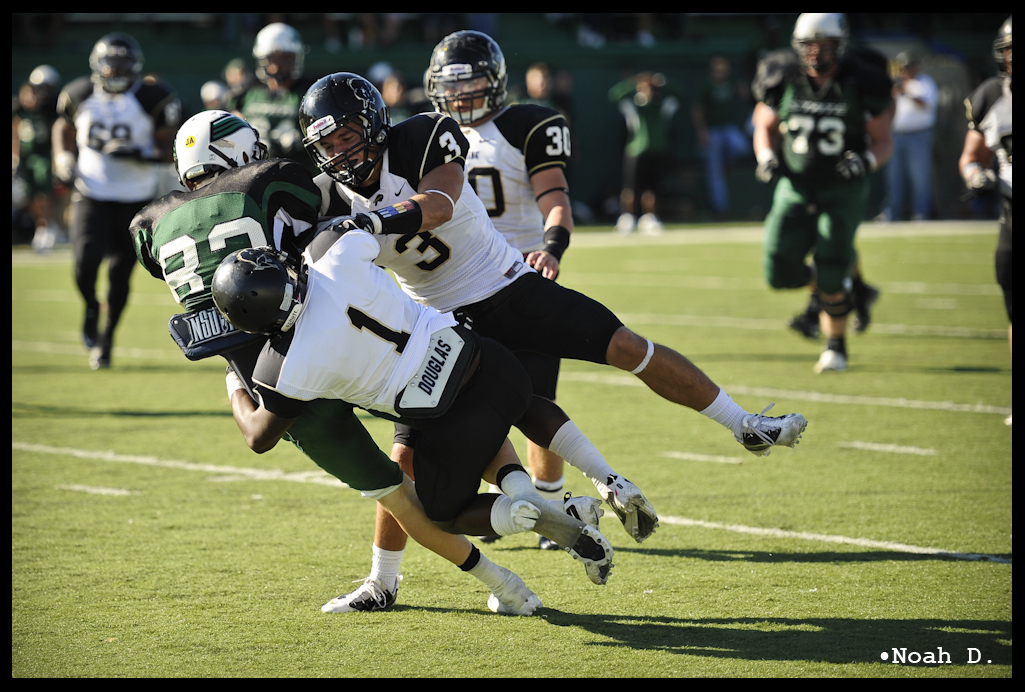We took a break during filming a little promotional today to let classes change and get the reverberations in the atrium in which we filmed down to anything other than sounding like IHOP on National Pancake Day. (Gee, I hope that’s not a lost reference… just Google it.)
Filming was being done with a Canon 7D. Undoubtedly, it is one of the most versatile cameras made for the price-point.
I’m known as a solid cheerleader for Nikon and Leica (long-time equipment of choice, no sponsorship) but there was a time that I shot all three platforms – a Canon 7D & 5Dmk1, Nikon D700 & D300, and Leica M’s.
Pardon the descent into geekitude, but there is a reason that I use the equipment that I do. Nobody can say I’m bias due to the fact that I’ve never shot from the other side: I certainly have! I’m bias because I know what works and, for me… and Canon isn’t it. Don’t get me wrong, it has nothing to do with build quality: I sold my equipment to the University and the students are still wearing it out today in Student Publications office. And it had nothing to do with the backwards zoom and reversed focus ring: Nikon and Leica (and most Sigma and Tamron and Tokina) all build their lenses focusing and zooming the same way… but not Canon.
I left Canon because of two things: color rendition and lens quality. To my eye, Canon cameras have an artificial look to their images. The color isn’t real enough. Now, some will use this as a praise to Canon and see that as a strike against Nikon when they aren’t able to get the same look naturally out of the camera. I look at it as a major strike against the Canon designers: if I want an artificially colored image with over-saturated reds and oranges, I can process something through Lightroom or Photoshop. Or I can make it with Instagram. (Ouch!) Please don’t make it difficult to get a naturally colored image straight from the camera.
Okay, all fairness, I’m slightly exaggerating the extent to which the photos are “unnatural”… but this is a conscious, fairly well-documented decision by the Canon designers for years. Leica selected and designed the famous Kodak CCD sensor because it has the response of Kodachrome (even though it has some limitations). And Nikon designed their sensors based on the natural world in which we exist: natural blues and greens. Canon has a decidedly “Canon” look to me, overly warm whites and saturated reds/yellows/oranges with muddled details in colored objects in the shadows.
Second gripe: lenses. I noticed a while back that the DxOMark tests of overall lens performance (sharpness, quality, resolution, etc) had only five different Canon lenses of the top 50 lenses currently rated. Okay, I hate pixel peeping as much as the next working photographer, but for some actual objective testing – instead of my: “Blah blah blah… I prefer this color… blah blah” – does anyone not notice that two Samyang lenses (the 85/1.4 and the 35/1.4) that, bought together, cost less than $800… and perform better than Canon’s multi-thousand-dollar 300/2.8? Yes, Samyang is manual focus, but… so what? The other couple-dozen Nikkor and Zeiss lenses on the list (and at the top of the list) do just fine.
Pixel peepers also say, “Well, the Canon lenses perform better on objective sharpness testing with Optical Metric Scores.” (That’s the tests done without the camera that measures strictly objective optical quality such as corner sharpness and chromatic aberrations.) Yep, you’re right. That takes the camera out of the equation… which… kinda is a pointless test, if you really think about it: who cares if a lens is sharper if you can’t get a sharp image out of the camera you’re trying to mount it to…? You are trying to record the image, right?
The greatest problem I feel with Canon is borderline pretentious: I can pick up a Canon camera and make pretty decent images without knowing the camera at all. A few factors are involved: the fact that the camera has an “unnatural” color automatically makes the photos look “artsy-er” than they really are, many of the cameras are sold with super-long versatile zooms, and the automatic modes (yes, Aperture Priority is automatic) on the cameras are tremendously intuitive. Brilliant marketing, yes, but not brilliant for “photography”… I can do these things with a digi-cam. I take great pride in the fact that I cannot hand off my M-E or D700 to anyone and they can immediately make great images.
Is this job security? Nope, it’s refinement of my craft. Why would I select a camera that does not challenge me? By challenge, I grow. By overcoming obstacles means that future obstacles… aren’t actually obstacles.
But that’s just me… So… there’s all that. Diatribe: done.
On the other hand, Canon has the market cornered in the cinema-quality video realm. Sorry, Nikon, having shot both, there’s really no comparison yet. Even with the almighty D800/D600, it’s just not the same. But I make videos a handful of times a year and cinema quality is rarely my concern. But again, for better or worse, Canon video capture is crazy easy…
Also, Leica, I love rangefinders and love shooting with them, but your color – even with Kodachrome responses – sometimes misses the mark. (But, I say that inconsistency is usually mine.)
Whatever your choice, it should be your choice. It is the difference between Ford and Chevrolet, iPhone and Android, etc.
Here’s the thesis of this whole rant: Realize that the equipment you shoot should not get in the way of the creation of your images and it should feel good to you. At my current level – admittedly not New York Times or Bank of America – I have yet to have a client come to me upset that I used a Nikon instead of a Canon because of the resolving power of the lenses or refuse to pay me because the rendering of the color “red” was 18-1658 TCX instead of 18-1658 TPX.
As long as the equipment makes the images that you intend (and for irony I converted this Canon 7D-made image up top into black and white)… it sincerely doesn’t matter.
Stay tuned…
-Noah D.




